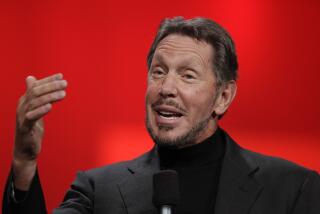Australian Beer Baron Finds Empire Awash in Trouble
- Share via
SYDNEY, Australia — John Elliott, who turned a small fruit and jam canner into the world’s fourth-largest brewer, has become another swashbuckling Australian tycoon whose corporate ship has run aground.
Just 12 months ago, Elliott, head of the Elders IXL brewing, agriculture and finance group, said he was putting together a rescue plan for embattled businessman Alan Bond, who resigned last week as chairman of debt-laden Bond Corp.
Now Elliott has had to erect a safety net of his own.
His holding company has arranged to sell a 19.9% stake in Elders to Japan’s Asahi Breweries Ltd. for $797 million.
The linkup gives one of Japan’s largest brewers a foothold in Australia.
The investment came not a moment too soon for Elders. The maker of Fosters lager announced last week that it has suffered the largest annual loss in Australian corporate history--$1 billion. That far eclipsed the $650 million lost by Bond Corp. in 1989.
Elders’ shares have sunk. From a high of $2.03 this year, they fell to $1.14 last week--their lowest since the 1987 stock market crash.
There are a lot of similarities between Alan Bond and his would-be savior, Elliott. The two gained control of more than 85% of Australia’s beer market, became household names through a string of aggressive takeovers and were well known for their sporting interests--in Bond’s case, yachting; in Elliott’s, Australian Rules football.
High debts in the aftermath of the 1987 market crash were their undoing. Months after Bond rejected Elliott’s helping hand, Elliott’s empire began to wobble. In May he stepped down as chief executive of Elders.
As his corporate problems mounted, his political career also deteriorated. President of the opposition Liberal party, Elliott had differences with party leaders in the months before the March election. He said he would not seek the presidency a second term, effectively ending his political ambitions.
Elliott’s rise began 17 years ago. Henry Jones IXL was a run-down company when Elliott, fresh from five years with the McKinsey & Co. management consulting group, took it over in 1973.
Within eight years, the hefty Elliott--a cartoonist’s delight with his large nose--had raised its profit 20 times over with a series of takeovers bearing his trademark of speed and surprise.
In 1981, Henry Jones took over one of Australia’s oldest companies, Elder Smith Goldsbrough Mort, to become Elders IXL. The growth continued, Elliott claiming that he would “Fosterize” the world.
The seeds of his demise were sown in the late 1980s, when Harlin, a private firm run by Elliott and other Elders directors, raised its stake in Elders above Australia’s 20% takeover threshold. They were forced to launch a full bid for the company.
The offering price had to match what Harlin paid for its initial stake--well above the prevailing market level. The bid valued Elders at $4.6 billion, making it the biggest management buyout in Australian history.
Harlin, which got its only income from Elders dividends, secured 55% of Elders shares when the offer closed in September, 1989. It financed the buyout through massive borrowing.
When Elders posted a 46% fall in net profit in February of this year, doubts about Harlin’s ability to service its debts multiplied, and Elders shares began falling.
In March, Elliott, the 48-year-old son of a Melbourne bank employee, announced a restructuring of the Elders group. He said he would sell financial assets, spin off agribusiness operations and take over the brewing business of Britain’s Grand Metropolitan.
In April, for the third time in four years, British regulatory authorities moved to block Elliott’s expansion into British brewing, referring the Grand Met deal to the Monopolies and Mergers Commission. The commission is expected to rule in the next few weeks on whether the deal can go through.
Elliott’s resignation in May was seen as an attempt to mollify shareholders and creditors, but he remains non-executive chairman.
Earlier this month, Harlin, desperate to raise cash to calm bankers, agreed to sell a stake in Elders to Asahi Breweries. The move halved Harlin’s debt to around $800 million.
But doubts over Harlin’s ability to service its debt persists, and many analysts believe that Asahi will be asked to bite off another chunk of Elders in the near future.
More to Read
Inside the business of entertainment
The Wide Shot brings you news, analysis and insights on everything from streaming wars to production — and what it all means for the future.
You may occasionally receive promotional content from the Los Angeles Times.










